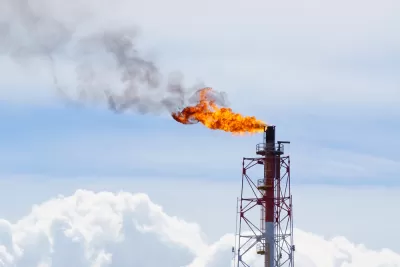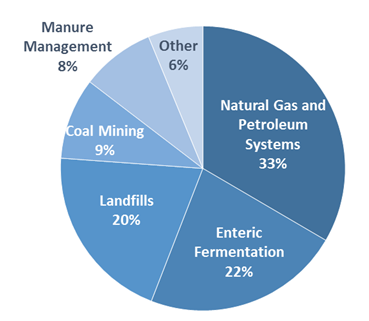While Congress is attempting to roll back a federal regulation on methane emissions, the California Air Resources Board approved a landmark rule that regulates methane emissions from onshore and offshore oil and gas production and storage facilities.

"While the federal government may be going backwards, California is going to be moving forwards,” Tim O’Connor, director of the California oil and gas program at the Environmental Defense Fund, told reporters in a conference call Wednesday, reported Rob Nikolewski for the Union-Tribune.
On the federal level, O'Connor was referring to the use of the Congressional Review Act to "overturn an Obama drilling rule" to limit the venting and flaring of methane emissions on federal lands. [More information at end of post.]
On the state level, he was referring to agenda item #17-3-6 (pdf) at Thursday's California Air Resources Board meeting.
"California air quality officials have approved what are widely considered to be the most rigorous and comprehensive regulations in the country for controlling methane emissions, a move that helps cement the state’s status as a standard-bearer for environmental protection," reports Dominic Fracassa for the San Francisco Chronicle. The rule, "Greenhouse Gas Emission Standards for Crude Oil and Natural Gas Facilities" (pdf) "seek(s) to curb methane emissions at oil and gas production plants by up to 45 percent over the next nine years."
Methane as a greenhouse gas
Critics of the rule were quick to note that the oil and gas industry is not the largest emitter of the second most prevalent greenhouse gas, pound for pound about 25 times greater than CO2 over a 100-year period, according to the U.S. Environmental Protection Agency. According the the pie chart on page 5 of the CARB presentation (pdf), agriculture is responsible for 58 percent, followed by landfills at 20 percent, pipelines at 9 percent, and oil and gas extraction and storage at 4 percent.
“Our industry is not the top emitter of methane in the state, yet this rule will add to the nation’s toughest regulations that our operators must follow, such as cap and trade,” Rock Zierman, the chief executive officer of industry trade group the California Independent Petroleum Association, said in a statement. “We hope that regulators will provide ample time for implementation and ensure that the program is fairly and consistently enforced across the state.”

On a national level, U.S. methane emissions, by source. (Source EPA. All emission estimates from the Inventory of U.S. Greenhouse Gas Emissions and Sinks: 1990-2014.)
Federal Methane Emissions rule
A few final notes on the federal attempt to rescind the aforementioned rule on venting and flaring of methane from oil and natural gas drilling sites on federal and Indian lands. On Feb 3, the House passed a resolution (H.J.Res.36) to reverse the Department of Interior's Methane and Waste Prevention Rule. E&E News reports on March 22 that Senate Environment and Public Works Chairman John Barrasso (R-Wyo.) has encountered difficulties in rounding up votes for their resolution, S.J. Res. 11.
[P]roponents of the measure say that with two GOP senators — Maine's Susan Collins and South Carolina's Lindsey Graham — expected to oppose it, the margin of error is razor thin.
FULL STORY: California passes nation’s toughest methane emission regulations

Alabama: Trump Terminates Settlements for Black Communities Harmed By Raw Sewage
Trump deemed the landmark civil rights agreement “illegal DEI and environmental justice policy.”

Study: Maui’s Plan to Convert Vacation Rentals to Long-Term Housing Could Cause Nearly $1 Billion Economic Loss
The plan would reduce visitor accommodation by 25% resulting in 1,900 jobs lost.

Why Should We Subsidize Public Transportation?
Many public transit agencies face financial stress due to rising costs, declining fare revenue, and declining subsidies. Transit advocates must provide a strong business case for increasing public transit funding.

Paris Bike Boom Leads to Steep Drop in Air Pollution
The French city’s air quality has improved dramatically in the past 20 years, coinciding with a growth in cycling.

Why Housing Costs More to Build in California Than in Texas
Hard costs like labor and materials combined with ‘soft’ costs such as permitting make building in the San Francisco Bay Area almost three times as costly as in Texas cities.

San Diego County Sees a Rise in Urban Coyotes
San Diego County experiences a rise in urban coyotes, as sightings become prevalent throughout its urban neighbourhoods and surrounding areas.
Urban Design for Planners 1: Software Tools
This six-course series explores essential urban design concepts using open source software and equips planners with the tools they need to participate fully in the urban design process.
Planning for Universal Design
Learn the tools for implementing Universal Design in planning regulations.
Smith Gee Studio
Alamo Area Metropolitan Planning Organization
City of Santa Clarita
Institute for Housing and Urban Development Studies (IHS)
City of Grandview
Harvard GSD Executive Education
Toledo-Lucas County Plan Commissions
Salt Lake City
NYU Wagner Graduate School of Public Service



























